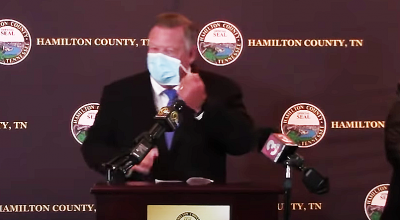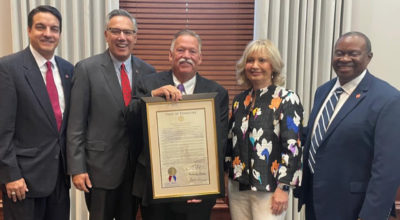
CHATTANOOGA, Tenn., July 30, 2022 — Chattanooga is supposedly a “smart city,” on its way to become a star in the takeover of digital barons and managerial classes of what has been the arena of government.
By David Tulis / NoogaRadio Network
Government is rightly held in low regard among many Chattanoogans on account of its myriad abuses of law, its misuse of authority and generalized rejection of constitutional liberties such as free movement, the right to be arrested under a warrant and the right to be free from attainder, or, in the noncapital sense, bills of pains and punishments; such is the name for that police power function that outlaws people as guilty by group.
The city bills taxpayers F$85.44 million this year for maintaining police, a militarized occupation army that routinely harasses members of the public by poaching on the authority of others, an agency in which lying and perjury are important parts of the code of honor, and lawlessness is approved by the mayor’s office well before Tim Kelly took office.
The city says CPD “is primarily responsible for the citing of individuals for a wide variety of violations of federal, Tennessee and local laws. Citations are often related to traffic offenses.”
Cops give citations for many alleged offenses, the documents seen as being a “negative monetary incentive[] that attempt[s] to influence an individual’s behavior.”
The city says “traffic” citations for speeding, reckless driving, and other safety related “traffic” encounters “have been proven to reduce traffic crash incidents.”
‘Safety’ vs ‘economic’ traffic cases
Some poaching is under pretended claim of “safety,” a magical word that justifies many encroachments upon the rights of the people. Other activities against roadway users are, the city admits, economic “violations” with what appears to be a social engineering purpose.
Says the city on its website, “Safety stops in this case are defined as traffic light violations, stop sign violations, speeding violations, seat belt violations, and other types of violations related to safety.
“The other type, economic stops, are often a result of an out of date city sticker, lack of insurance (financial responsibility), or out of date auto registration. Typically, there are disproportionate citation rates for economic citations for BIPOC communities and there are no links to decreases in traffic accidents due to these citation types.”
The city says, “Research has shown racial disparities can occur when comparing citation volumes broken down by race for different traffic stop/violation types.”
BIPOC is managerial lingo for “black, indigenous, people of color,” whose members comprise 32.7 percent of the city population.
“The two charts below show the distribution of cited individuals broken down by safety violations and economic violations. Per the data, the safety violations appear consistent with Chattanooga’s population. The data also reveals Chattanooga matches similar research for economic violations whereas there is a significant disproportionate amount of economic violation only type traffic stops for the BIPOC community.”
CPD routinely violates state law
Driver licenses are “administered” by the department of safety. Vehicle registration (converting a car or truck into a commercial instrumentality) is “administered” by the department of revenue. Insurance by safety. This administrative law upon citizenry in the city is upon parties who are neither common nor private carriers involved in commercial use of the streets for hire, and not subject to any ordinance regulating motor vehicle use in the city.
CPD intervenes, poaches, enforces ultra vires and without authority these relations between certain people in cars and these administrators. They enforce the law CRIMINALLY, to the continued harm of the weak and the poor, especially African-Americans.

Violations of law are crimes, and using police power outside of law is not just policy, but crime prosecutable.
My efforts since Feb. 20, 2018, to have the city observe the limits of law have gotten nowhere, have not been front and center in any defense of a criminal charge (that I am aware of), have not been used to sue for damages civilly, and have not prompted any policy changes. Notice was in person, to every member of the city council, and hence to all agents of the corporation, such as cops.
My suit against Gov. Lee for fraud highlights the willingness of officials to simply reject black-letter law and ignore all the constitutional harms that follow after open breach of trust against a legislative directive in Tennessee code annotated.
These acts by Gov. Lee and co-respondent Becky Barnes of the health department, are intentional and knowing. They are willful, as discussed in a Chattanooga-connected case.
The word “willfully” has been characterized as a word of many meanings whose construction depends on the context in which it appears. Spies v. United States, 317 U.S. 492, 497, 63 S.Ct. 364, 87 L.Ed. 418 (1943); United States v. Phillips, 19 F.3d 1565, 1576–77 (11th Cir.1994). Most obviously, it differentiates between deliberate and unintended conduct. State ex rel. Flowers v. Tenn. Trucking Ass’n Self Ins. Group Trust, 209 S.W.3d at 612. However, in criminal law, “willfully” connotes a culpable state of mind. In the criminal context, a willful act is one undertaken for a bad purpose. Bryan v. United States, 524 U.S. 184, 191, 118 S.Ct. 1939, 141 L.Ed.2d 197 (1998); State v. Braden, 867 S.W.2d 750, 761 (Tenn.Crim.App.1993) (upholding an instruction stating that “[a]n act is done willfully if done voluntarily and intentionally and with the specific intent to do something the law forbids”).
Even in civil contempt proceedings, the definition of willful is significant.
In the context of a civil contempt proceeding under Tenn.Code Ann. § 29–2–102(3), acting willfully does not require the same standard of culpability that is required in the criminal context. State ex rel. Flowers v. Tenn. Trucking Ass’n Self Ins. Group Trust, 209 S.W.3d at 612. Rather, willful conduct consists of acts or failures to act that are intentional or voluntary rather than accidental or inadvertent. Conduct is ‘willful’ if it is the product of free will rather than coercion. Thus, a person acts ‘willfully’ if he or she is a free agent, knows what he or she is doing, and intends to do what he or she is doing. State ex rel. Flowers v. Tenn. Trucking Ass’n Self Ins. Group Trust, 209 S.W.3d at 612 (citations omitted).
Konvalinka v. Chattanooga-Hamilton Cnty. Hosp. Auth., 249 S.W.3d 346, 357 (Tenn. 2008)
The evils done in the Covid-19 fraud, and those by officers rejecting limits in law, are willful. They are intentional and done in bad faith.
Police reform is based on law, not data
Thanks to its World Economic Forum persuasion, the city is making itself unable to see the wrongs done by cops in their proper context.
That is in the context of moral wrong and outright sin.
The city’s work to become a WEF-blessed “smart city” make data pre-eminent. Its operation is not about limits under law in light of constitutional government and deep, deep respect for the man or woman, or individual person.
It favors making change based on data, not on the Christian premise inherent in much of American law.
That premise is the limits on the power of the sword, with all areas of life inhabited by people who have done no evil and no harm — that area free from surveillance, control, judgment or bother, an area in which the people are left alone. The “One Chattanooga” scheme is about synthesis. The Christian or traditional view contains antithesis. The antithesis is between good and evil, right and wrong, public and private. The public sector takes controls when evil strikes, and the criminal or tortfeasor is brought to bar.
Officials’ intention to create a managerial stakeholder capitalism business-oriented and data-centric totalitarianism views policing not in terms of law, but of management and data.
The data cited here is the lens through which a reform might come, if at all. If police power is to be curbed, it’s not because it is wilful and evil and violative of state law and victims’ constitutional rights to due process, according to these “stakeholders.” Rather, it’s because it such abuse is not inclusive, is harmful to the plan’s pretended interest in working people and commoners, and shows a disproportion in the graphs.
My Tennessee transportation administrative notice rightly divides the word of constitution and Tennessee code, to show that traffic arrests and citations, especially the ubiquitous “driving on revoked,” is illicit as against anyone on the road who is not involved in commerce.
All officers are personally and individually on the line for damages and a lawsuit, given notice. Does the city care about these “human resources?”
This 20-page legal notice lets you fight back vs. illicit ‘traffic stops’ — sue for damages, have defense in your criminal case
http://s6.voscast.com:7162/stream to hear David’s show live 8 a.m. weekdays

